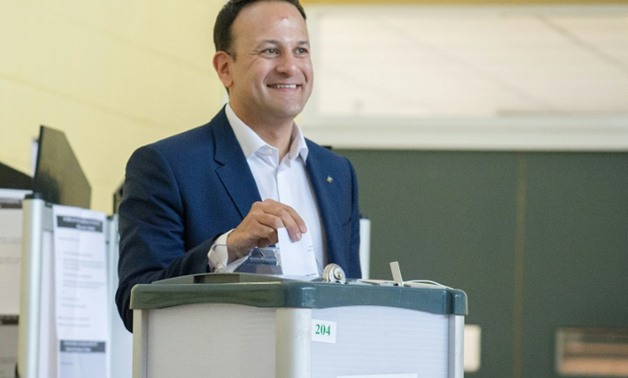
Ireland's Prime Minister Leo Varadakar casts his vote in the staunchly Catholic country's abortion referendum
26 May 2018: People in Ireland voted Friday in a landmark referendum on whether the traditionally Catholic country should liberalise some of the strictest abortion laws in Europe.
Nearly 3.5 million voters were asked whether they wanted to overturn a constitutional ban on abortion, following an emotional campaign.
The pro-choice campaign had an early lead in opinion polls but lost some of its advantage in recent weeks and experts have predicted the result could be exceptionally close, with many undecided voters.
People arriving at polling stations spoke about the momentousness of a morally complex decision.
Chris Garvin, 20, who works in human resources in Dublin, said: "I'm not going to try and sway people's opinions but it's a very, very important matter and I think it's going to affect everybody's lives in some way."
Ireland has traditionally been one of the most religious countries in Europe. However, the Catholic Church's influence has waned in recent years following a series of child sex abuse scandals.
The referendum comes three months before a visit by Pope Francis for the World Meeting of Families and three years after Ireland voted to legalise same-sex marriage despite the Church's opposition.
"The fact that it's illegal for somebody in Ireland to seek medical treatment, having to travel outside the country and to feel that guilt, shame and isolation, it's absolutely shocking," said Belinda Nugent, 43, a community activist voting in north Dublin.
"I took it really personally, this vote."
But across the city, Finbar O'Regan, 50, said he wanted a "good, strong No vote".
The unemployed Dublin voter said his mother had been sent to England to have him born and adopted.
"I'm a staunch No. It's the life of an unborn baby. I'm one of the lucky ones," he said.
- 'I'm very emotional' -
After the closure of the polls at 10:00pm (2100 GMT), an exit poll of 3,000 voters will be released on national broadcaster RTE.
The count begins at 9:00am (0800 GMT) on Saturday, with the result expected to be announced at Dublin Castle later in the day.
Dublin voter Helen, 47, who did not want to give her surname, said: "I've been awake all night. I'm very emotional about this.
"We've been marching about this for years and desperately trying to get successive governments to do something. Hopefully our day has come," she said, outside a polling station opposite Dublin's cathedral.
Lawyer Rachel Cadden went to vote with her husband near the Dublin docks.
"I'm pregnant so it's especially important for us," the 30-year-old said.
"It means I can get the proper medical care that I should get and that my needs are put first whenever it comes to me being in hospital."
At present Ireland's eighth amendment -- which could be repealed in the vote -- recognises the "right to life of the unborn" with an "equal right to life of the mother".
But in the small town of Kilcullen, some 50 kilometres (32 miles) southwest of Dublin, voter Sean Murphy told AFP: "I don't see any reason to change from the position we are in at the moment".
Canvassers were out on the streets holding up signs and wearing t-shirts. One in southwest Dublin offered hugs to people who voted Yes.
Irish President Michael D. Higgins voted at St. Mary's Hospital in Dublin's Phoenix Park, close to his official residence.
Prime Minister Leo Varadkar, who backs the reform, said he was taking nothing for granted as he voted in the capital.
"Hopefully it'll be a Yes vote," he said.
He questioned whether Friday's exceptionally sunny weather would see more voters heading to the polling stations or going out enjoying themselves.
- 170,000 women -
The eighth amendment to the Irish constitution was installed following a 1983 referendum which approved outlawing abortion.
Anyone terminating a pregnancy in Ireland could face 14 years in jail.
The ban has led to thousands of women travelling each year to neighbouring Britain, where terminations are legal, or increasingly turning to abortion pills sold online.
Since 1983, around 170,000 Irish women have gone abroad for terminations.
The law was tweaked in 2013 to allow terminations if the mother's life is at risk.
The Irish government has proposed that if the eighth amendment is repealed, abortion will be allowed up to 12 weeks and between 12 and 24 weeks in exceptional circumstances.


Comments
Leave a Comment